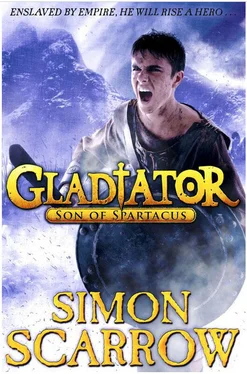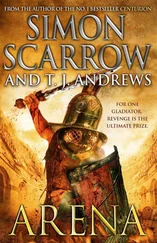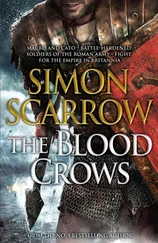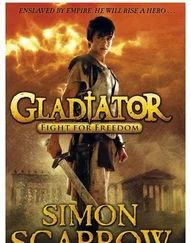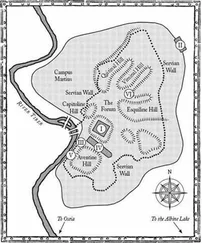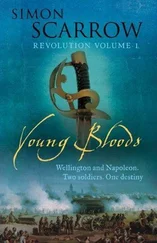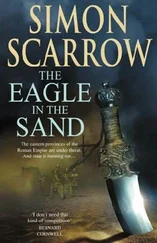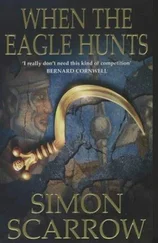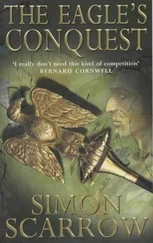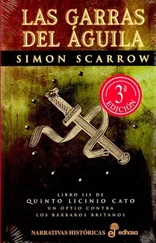Simon Scarrow - Son of Spartacus
Здесь есть возможность читать онлайн «Simon Scarrow - Son of Spartacus» весь текст электронной книги совершенно бесплатно (целиком полную версию без сокращений). В некоторых случаях можно слушать аудио, скачать через торрент в формате fb2 и присутствует краткое содержание. Жанр: Исторические приключения, на английском языке. Описание произведения, (предисловие) а так же отзывы посетителей доступны на портале библиотеки ЛибКат.
- Название:Son of Spartacus
- Автор:
- Жанр:
- Год:неизвестен
- ISBN:нет данных
- Рейтинг книги:5 / 5. Голосов: 1
-
Избранное:Добавить в избранное
- Отзывы:
-
Ваша оценка:
- 100
- 1
- 2
- 3
- 4
- 5
Son of Spartacus: краткое содержание, описание и аннотация
Предлагаем к чтению аннотацию, описание, краткое содержание или предисловие (зависит от того, что написал сам автор книги «Son of Spartacus»). Если вы не нашли необходимую информацию о книге — напишите в комментариях, мы постараемся отыскать её.
Son of Spartacus — читать онлайн бесплатно полную книгу (весь текст) целиком
Ниже представлен текст книги, разбитый по страницам. Система сохранения места последней прочитанной страницы, позволяет с удобством читать онлайн бесплатно книгу «Son of Spartacus», без необходимости каждый раз заново искать на чём Вы остановились. Поставьте закладку, и сможете в любой момент перейти на страницу, на которой закончили чтение.
Интервал:
Закладка:
Mandracus leaned forward with an excited expression. ‘Out with it!’
Commius nodded and drew a deep, calming breath before he continued. ‘We had burned a villa near Mutina and were moving on when we saw a large column of soldiers approaching along the road from Ariminum. We followed them to the town and that night captured a prisoner outside the gates, who we took back to our camp. It didn’t take long to get the truth out of him. Caesar has left most of his men in winter quarters. He has taken barely ten thousand men to hunt us down.’
‘Ten thousand.’ Mandracus sucked in a breath through his teeth. ‘That’s still too many for us to take on head-to-head.’
‘Wait,’ Commius intervened. ‘He has split his force in half. Caesar and barely five thousand are at Mutina. They are marching into the mountains even now, searching for us.’
‘Five thousand?’ Brixus rubbed his chin thoughtfully. ‘By the Gods, what a chance he has presented to us! His arrogance is typical of his kind. He considers us a rabble, fit meat for a small force of his prized legionaries. Well, we shall punish his mistake, Mandracus. It is time to put our own plan into action. Let Caesar march into our trap. Within a few days we shall have Marcus leading us into battle, and Caesar will be crushed and taken prisoner. Or better still, dead.’
15
‘They made a pretty thorough job of it,’ Festus said quietly as he prodded the blackened stump of a wooden post. He stepped back, placed his hands on his hips and surveyed the surrounding scene as Marcus dismounted. Marcus tethered the reins to an iron ring set in what was left of the villa’s main gate and joined Festus. Before them lay the remains of the buildings and gardens of what had once been the sprawling country home of a wealthy Roman. Now almost nothing stood higher than a man — only heaps of collapsed masonry and tiles and scorched skeletal lengths of timber. Smoke still trailed into the air, wafting up into the haze that obscured the sun. Soldiers were picking their way through the debris, searching for any sign of survivors, or valuables that might be saved from the ruins. Marcus sniffed and wrinkled his nose at the acrid stench of burning.
‘I can’t see any bodies,’ he muttered.
‘Not yet. But there will be a few,’ Festus replied grimly. ‘They would have surprised the place, freed all the slaves and taken what loot they could carry, then set fire to it. The steward of the villa and the guards are probably dead. Their bodies will be under that lot somewhere. Not that there will be much left of them after the fire.’
Both of them were silent a moment before Marcus spoke again. ‘We can’t be more than ten miles from Mutina. The rebels who did this were taking quite a risk venturing this far from the mountains.’
‘Or they’re becoming more confident. If so, then Caesar should be worried. Looks like Brixus and his men aren’t afraid of the local garrisons any more. Only the largest towns will be safe from their raids if Caesar’s plan fails.’
Marcus looked back through the remains of the gate. Caesar was delivering a verbal report of the attack to one of his staff officers before sending him to Rome. It would take several days to reach the capital, where a senator would be informed of the destruction of his property. But there would be other consequences. The burning of the villa would provide Caesar’s political enemies with another excuse to attack him in the Senate. Marcus could already imagine the scene with Cato rising to his feet to denounce Caesar. If Caesar couldn’t handle a gang of rebel slaves, what chance had he of taking on the Gauls that threatened Italia’s northern frontier? It would be better to recall an incompetent general and send a more worthy replacement, Cato would argue. Meanwhile, Crassus would sit back smugly and enjoy the damage to his rival’s reputation.
‘What do you think he will do now?’ asked Marcus. ‘Send for more men?’
‘No. He’ll stick to the plan. This changes nothing. If he sends for reinforcements, it would be as good as admitting he had made a mistake. You know what he’s like. He’ll never admit to making a mistake if he can avoid it.’
There was a pounding of hoofs and Marcus turned to see the staff officer galloping back in the direction of the junction where the Via Flamina branched off towards Rome.
Caesar cupped a hand to his mouth and called out. ‘Reform column! We’re moving on!’
Marcus untethered his horse and climbed back into the saddle. He waited for Festus and the two of them walked their mounts into the road that passed the gate. Behind them, the centurions and optios bellowed at the men to abandon their search and rejoin the column. Once every man was back in position, Caesar waved his arm forward and the cavalry led them along the road that climbed into the foothills of the Apennines. A squadron of cavalry rode a short distance ahead to scout the way and guard against ambush. Behind them came the general and his officers and bodyguards and then the infantry, trudging along four abreast, marching yokes resting on the padding they wore across their shoulders. After the infantry came the small baggage train, carrying a few days’ supply of grain and the soldiers’ tents, which would offer them some protection against the freezing temperatures up in the mountains. With them trundled the wagon of Decimus, while he rode beside on a horse. At the tail of the column came the cohort of legionaries assigned to serve as the rearguard.
As the column left the smouldering remains of the villa behind, Marcus’s sense of foreboding increased. He had begun to doubt the wisdom of Caesar’s plan. With little known about the strength of the enemy, it made no sense to start out with a modest force and then proceed to divide it.
The truth about his father’s identity was another matter that troubled him. It seemed as if a quiet voice constantly encouraged him to accept the challenge of living in a manner that would make his father, Spartacus, proud. The same voice constantly reminded him of the evils of slavery and the duty of everyone aware of its injustice to stand up and fight those who enslaved other people. And that meant fighting the Roman Empire itself and all those who served it. Especially men like Caesar.
And yet Marcus knew the struggle was not as simple as that. He remembered the tales that Titus had told him when he was a young boy. Titus had fought the Gauls, Parthians and other barbarians, and the vivid descriptions of their atrocities had chilled Marcus’s blood. It had also convinced him there were worse people in this world than those of Rome. There had to be a middle way between the traditions of Rome and those who wanted an end to slavery. Or was that just the wishful thinking of a young boy? Yet here he was, riding beside the men marching to hunt down and kill those who opposed slavery. Part of Marcus thought he was on the wrong side. That he should take his chance and run away to join Brixus and his men. But then he remembered his mother. Her best chance of survival rested on Caesar helping Marcus to track her down and set her free. With a leaden feeling in his heart, Marcus knew he was trapped. He had to remain at Caesar’s side and serve the Roman general until his mother was safe. After that, finally, he could decide his own future.
The column continued into the mountains, and the road gave way to a narrow track hemmed in on either side by forests of pine trees enveloped in mists and cloud. The grey skies steadily darkened and there were frequent showers of rain. Marcus hunched in his saddle and daydreamed of sitting in front of a fire at Portia’s house in Ariminum when the current campaign was over. There, with Festus and Caesar, he would tell Portia of their experiences, and perhaps she would secretly give Marcus a knowing look.
Читать дальшеИнтервал:
Закладка:
Похожие книги на «Son of Spartacus»
Представляем Вашему вниманию похожие книги на «Son of Spartacus» списком для выбора. Мы отобрали схожую по названию и смыслу литературу в надежде предоставить читателям больше вариантов отыскать новые, интересные, ещё непрочитанные произведения.
Обсуждение, отзывы о книге «Son of Spartacus» и просто собственные мнения читателей. Оставьте ваши комментарии, напишите, что Вы думаете о произведении, его смысле или главных героях. Укажите что конкретно понравилось, а что нет, и почему Вы так считаете.
